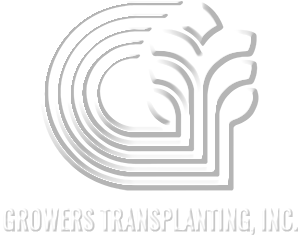SERVICES
GTI SERVICES
COMMITTED TO EXCELLENCE
Beyond the plants we produce for farms across the nation, we provide adjacent services to help bring value. From transplanting alongside farmers and greenhouse production, GTI continues to be an industry leader in excellence.
TRANSPLANTING
PROPAGATION
SEEDLING PRODUCTION
GRAFTING
BENEFITS OF TRANSPLANTING
Transplanting is an economically and environmentally ideal alternative to seeding. Transplanting achieves what many are looking to accomplish: increase yields and quality, while decreasing costs, inputs and environmental impact.

Enhanced Uniformity & Export Quality
The precise spacing between transplanted crops allows them to mature uniformly without competition from other plants such as in direct seeding. Due to this, we see a significant increase in export quality of our transplants, such as broccoli which features highly uniform crowns. Additionally, there are some crops that naturally lend themselves to greater success as transplants, such as onions–one of our latest transplanted commodities–which don’t perform well direct seeded but thrive as a transplant. Stand problems due to either wind and weather or poor performance of direct seeded crops are also minimized with the use of transplants.

Climate Change & Shifting Weather Adaptation
As many countries look to address shifting weather patterns and agricultural adaption to those forces, transplanting offers a solution. There is greater flexibility in avoiding weather fronts since plants need less time in the ground. Then, once transplants are in the field, they will grow stronger than field seeded plants because of the sturdy root system that has been developed- one of the principal goals of transplanting. Plants are then more conditioned to withstand less-than-ideal weather.

Decreased Weed Pressure
Transplants minimize weed pressure by allowing plants less time in the ground and, with many crops, not having plants in the ground when weeds germinate. Unique to transplanting is the advantageous use of herbicides in tandem with transplanted crops. This is not suited for direct seeded crops as a pre-plant and has the greatest impact on crops grown organically, for which there are few effective herbicides on the market and great opportunity for market growth.

Reductions in Input Costs & Usage
Transplanted commodities minimize inputs. Efficient greenhouse irrigation minimizes water waste in early stages of plant growth and integrated pest management programs eliminate excessive pesticide. Due to the shorter time spent in the ground, transplanted commodities enable open fields to be a finisher to healthy plant growth rather than the bearer of all stresses and excess inputs.

Efficient ground utilization & Faster Turnaround
Transplanting increases ground utilization and enables faster turnaround times. This decreases the demand on land usage and provides opportunities for an additional pre-season harvest and a higher volume and yield potential per acre per season. Efficient transplanting can eliminate the need for expanding land base, ideal for locations with limited fertile growing space or capital reserves.

MInimized labor cost
Transplanting reduces the need for general labor. Not only do our automated transplanters plant at a rate of up to 2 acres per hour with minimal manpower, but the reduced weed problems and upkeep associated with transplants eliminate the need for such practices as crop thinning and lessens weed management. These key elements result in significant, immediate and long-term savings.

Increased seed cost savings
Transplanting offers great savings in seeds costs because the quantity of seeds used in the greenhouse is significantly lower than in direct seeding. Transplanted crops mature more uniformly, and allow for the luxury of a nearly 100% stand.

Visit Us
370 Espinosa Road
Salinas, CA 93907
Open Hours
M-F: 7am - 5pm
Sat: 7am - 12pm
Sun: Closed
